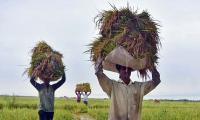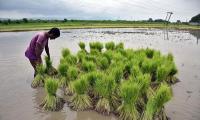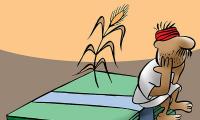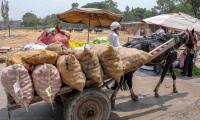MSP Procurement Disincentivizes Crop Diversification: Niti Aayog
Niti Aayog panel recommends restricting wheat and rice procurement at MSP to meet food security needs, urging diversification towards high-value crops.
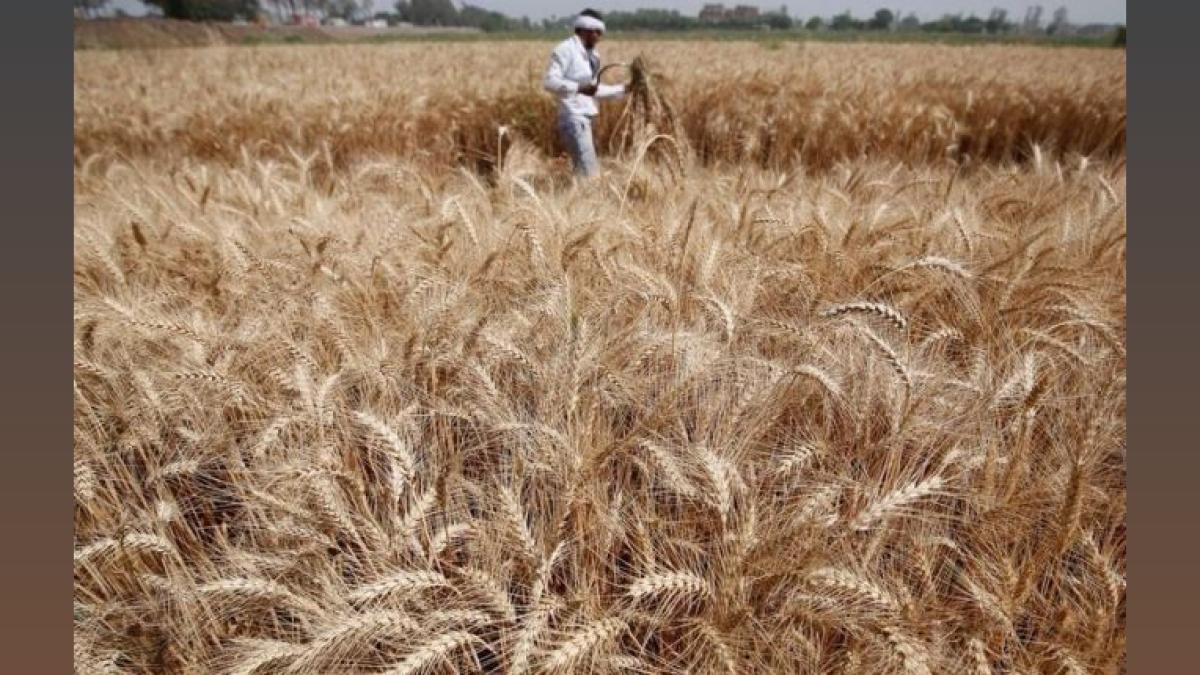
New Delhi, Feb 29 (PTI) A working group under the Niti Aayog said an "open-ended" procurement of wheat and rice from farmers at MSP acts as a disincentive for crop diversification, and suggested that the Centre should purchase these commodities only to meet the requirement under the food law and other welfare schemes.
The 23-member working group on 'Crop Husbandry, Agriculture Inputs, Demand and Supply', set up by the Aayog in 2022 under PS Birthal, director, ICAR-NIAP, was tasked to study and analyse the trends in demand and supply of major food commodities and examine the changing consumer preferences for food and related items by 2047 and make suitable recommendations.
"The open-ended procurement of rice and wheat at minimum support prices acts as a disincentive for diversification towards high-value and riskier crops.
"It is, therefore, important to re-think about the policy of open-ended procurement, and restrict the procurement of rice and wheat to the requirements of the country's food security and welfare schemes," the report said.
The report comes at a time when some farmers' groups, mainly from Punjab, are spearheading the 'Delhi Chalo' march to press the government to accept their demands, including a legal guarantee for Minimum Support Price (MSP) for crops and farm loan waiver.
"For the additional marketed surplus, farmers can be compensated through a price deficiency scheme.
"If they diversify away from rice and wheat, they can be compensated for the revenue foregone from these, if any," the report noted.
The report said that given the disproportionate increase in the demand for fruits, vegetables, pulses, edible oils, Nutri-cereals and maize compared to rice and wheat, it is important to evolve economically feasible cropping patterns suited to the resource endowments of different agro-ecological zones.
It also called for investing in infrastructure and value chains for perishable commodities.
The working group pitched for promoting millet consumption and production, saying consumption of millet has declined considerably.
It also suggested measures for improving compliance towards food safety standards for exports.
The working group noted that owing to the sustained rise in per capita income, changing lifestyles and increasing consumer preferences for nutritious foods, the consumption basket has been diversifying away from staple cereals towards high-value food commodities.
Other suggestions of the working group include evolving economically feasible cropping patterns suited to the resource endowments to meet the disproportionate increase in the demand for fruits, vegetables, pulses, edible oils, Nutri-cereals and maize compared to rice and wheat.
The report noted that pulses will remain one of the key components of the Indian diet and its production remains short of the demand.
"There is a need for a technological breakthrough in pulses, and for exploring possibilities of their cultivation in rice-fallow areas," it suggested.
Union Agriculture Minister Arjun Munda has recently said the government is open to talks with protesting farmers.
In the fourth round of talks with farmer leaders on February 18, a panel of three Union ministers proposed that government agencies would buy pulses, maize and cotton at the MSP for five years after entering into an agreement with farmers.
But protesting farmer unions rejected the proposal.
In a business-as-usual (BAU) scenario, the report noted that demand for foodgrains is estimated at 402 million tonnes in 2047-48, and to 415-437 million tonnes in the high-income growth (HIG) scenario.
The 23-member working group on 'Crop Husbandry, Agriculture Inputs, Demand and Supply', set up by the Aayog in 2022 under PS Birthal, director, ICAR-NIAP, was tasked to study and analyse the trends in demand and supply of major food commodities and examine the changing consumer preferences for food and related items by 2047 and make suitable recommendations.
"The open-ended procurement of rice and wheat at minimum support prices acts as a disincentive for diversification towards high-value and riskier crops.
"It is, therefore, important to re-think about the policy of open-ended procurement, and restrict the procurement of rice and wheat to the requirements of the country's food security and welfare schemes," the report said.
The report comes at a time when some farmers' groups, mainly from Punjab, are spearheading the 'Delhi Chalo' march to press the government to accept their demands, including a legal guarantee for Minimum Support Price (MSP) for crops and farm loan waiver.
"For the additional marketed surplus, farmers can be compensated through a price deficiency scheme.
"If they diversify away from rice and wheat, they can be compensated for the revenue foregone from these, if any," the report noted.
The report said that given the disproportionate increase in the demand for fruits, vegetables, pulses, edible oils, Nutri-cereals and maize compared to rice and wheat, it is important to evolve economically feasible cropping patterns suited to the resource endowments of different agro-ecological zones.
It also called for investing in infrastructure and value chains for perishable commodities.
The working group pitched for promoting millet consumption and production, saying consumption of millet has declined considerably.
It also suggested measures for improving compliance towards food safety standards for exports.
The working group noted that owing to the sustained rise in per capita income, changing lifestyles and increasing consumer preferences for nutritious foods, the consumption basket has been diversifying away from staple cereals towards high-value food commodities.
Other suggestions of the working group include evolving economically feasible cropping patterns suited to the resource endowments to meet the disproportionate increase in the demand for fruits, vegetables, pulses, edible oils, Nutri-cereals and maize compared to rice and wheat.
The report noted that pulses will remain one of the key components of the Indian diet and its production remains short of the demand.
"There is a need for a technological breakthrough in pulses, and for exploring possibilities of their cultivation in rice-fallow areas," it suggested.
Union Agriculture Minister Arjun Munda has recently said the government is open to talks with protesting farmers.
In the fourth round of talks with farmer leaders on February 18, a panel of three Union ministers proposed that government agencies would buy pulses, maize and cotton at the MSP for five years after entering into an agreement with farmers.
But protesting farmer unions rejected the proposal.
In a business-as-usual (BAU) scenario, the report noted that demand for foodgrains is estimated at 402 million tonnes in 2047-48, and to 415-437 million tonnes in the high-income growth (HIG) scenario.
You May Like To Read
TODAY'S MOST TRADED COMPANIES
- Company Name
- Price
- Volume
- Spicejet-Ltd
- 34.58 (+ 11.15)
- 24195618
- Vodafone-Idea-L
- 10.70 ( -0.93)
- 19992834
- Mehai-Technology
- 1.76 (+ 4.76)
- 11157943
- Sunshine-Capital
- 0.24 ( -4.00)
- 9057344
- Spright-Agro
- 0.68 (+ 3.03)
- 7725866
